2018 18-Day Campaign to End VAW

The National Demographic and Health Survey (NDHS), which is conducted by the Philippine Statistics Authority (PSA) every five years, provides a picture of the alarming incidence of VAW in the Philippines.
Results from the preliminary NDHS conducted in 2017 show that out of the 11,558 ever-married Filipino women aged 15 to 49 surveyed, one in 4 or 26% has experienced physical, sexual, or emotional violence committed by their husband or partner. These survey results are more indicative of the prevalence of violence in the country, since the administrative data on number of clients served by service providers like the police, social workers, and health workers only capture cases reported to these offices.
Considering such prevalence, the 2018 Campaign will continue to emphasize the role of all individuals in combating violence against women and girls within various institutions. To do this, the 2018 18-Day Campaign to End VAW shall focus on Primary Prevention to reduce incidents of VAW across the country. This can be achieved by letting people understand VAW from the point of view of victim-survivors. It is hoped that such deeper understanding would ignite compassion from stakeholders, so that they would not commit, condone, or remain silent about VAW. For service providers, such compassion towards victim-survivors would encourage them to provide better services to their clients.
Campaign Theme
The Inter-Agency Council on Violence Against Women (IACVAWC) adopted the theme “VAW-free community starts with Me” for the annual 18-Day Campaign to End VAW, from year 2016 to 2021. The theme elevates the campaign to positive advocacy as it enjoins everyone to pursue the common vision of a community free from violence against women and girls, and highlights what can be done to achieve such.
Campaign Objectives
The 2018 18-Day Campaign to End VAW aims to:
1. Give the public a glimpse of a VAW victim-survivor’s ordeal to later develop in them the virtue of compassion or malasakit
2. Promote awareness on the forms of violence women and girls experience, provide information on the laws protecting women and girls, and feature VAW-related services that people can access and avail
3. Gather public support for the Campaign.
Starts with Me
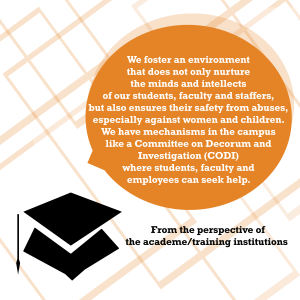
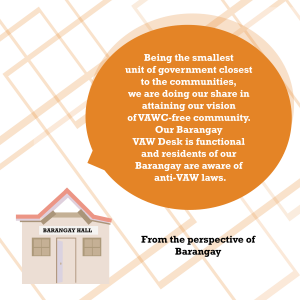
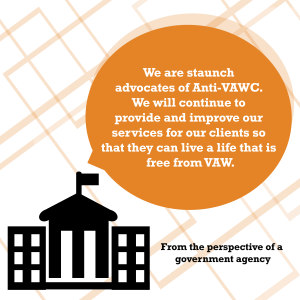
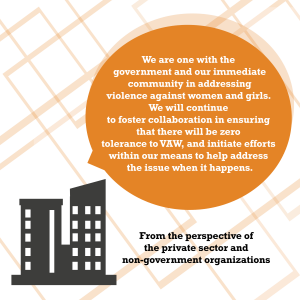
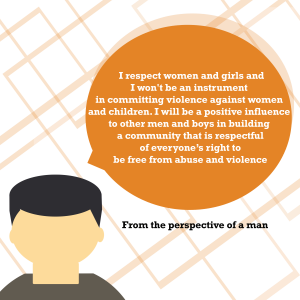
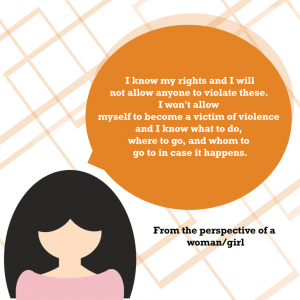
18 Things that We Can Do to Help End VAW
Woman/Girl
- Empower yourself. Know your rights and available courses of actions in case these rights are violated.
- Speak out and report to the authorities in case your rights are violated.
- Encourage others to fight for their rights.
Man/Boy
- Respect women and girls in your home, workplace, and community.
- Join male groups promoting Anti-VAW efforts and participate in discussions to broaden your awareness on the advocacy.
- Enlighten/advise perpetrators to seek help and join the male Anti-VAW supporters.
Government agency
- Equip yourselves with apt trainings and capacity development sessions to improve service delivery for your clients.
- Develop monitoring and evaluation strategy to assess the service to your clients supporters.
- Let people know that you provide the services! We need to inform the public that there are government offices that they can turn to and trust to assist them towards healing and seeking justice.
Barangay
- Ensure that your Barangay VAW Desk is functional. You can use the Barangay VAW Desk Handbook developed by PCW and DILG with partner agencies to guide you on what to do.
- Establish linkages with local and national government agencies, as well as other organizations near your barangay where you can refer victim-survivors of VAW for needed assistance which the barangay is not able to provide.
- Promote harmonious family and community relationships in your barangay which is grounded on mutual respect for human rights, and take proactive steps to attain a VAW-free community.
Private sector
- Support the Anti-VAW efforts of the government and your immediate community.
- Establish your own Action Desks where employees and clients can go to in case VAW happens.
- Develop internal rules to proactively ensure that your workplace is VAW-free.
Academe/training institutions
- Include concepts of VAW and women’s human rights in lesson plans/lesson guides of your teaching staff
- Continually conduct/spearhead anti-VAW advocacies in your campus, and if possible, to your immediate community through extension programs
- Setup a Committee on Decorum and Investigation (CODI) where students and employees can seek help
How can individuals and organizations get involved in the campaign to end VAW?
Organize your own event and invite others to join your event. Government agencies, non-government organizations, sectoral groups, private and civic organizations are enjoined to conduct their own activities in line with this year’s campaign theme and focus. You can get in touch with the Regional and Local Inter-Agency Committee Against Trafficking in Persons, VAWC, and Child Pornography (Regional/Local IACATVAWCP) in your area to know how you can participate in regional and local activities. You can also invite other groups and individuals to join your event. Hanging of streamer bearing this year’s campaign theme is also encouraged.
Live a Life Free from VAW. A life free from VAW – it’s our right! Freedom from VAW starts with knowing and respecting each person’s rights. You can help end VAW by doing the following:
- Never commit VAW
- Never condone VAW
- Never remain silent about VAW
- If you are, or you know someone who is a victim of VAW:
- Seek help from sympathetic family members and friends
- Report and seek the help of the barangay, social worker, police, NBI, or public attorney’s office nearest you.
Spread the word. Freedom from VAW is everyone’s concern. Be a firm advocate and partner in ending VAW. Know more about VAW and share the information with everyone. Support efforts within your school, workplace of community to eliminate VAW and achieve our vision of a VAW-free community.
Campaign Activities
The following key activities shall be conducted in partnership with key agencies and organizations:
1. VAW Experiential Museum

Using participative theatre, the VAW Experiential Museum is an effective way to make the public understand the difficult experiences of VAW victim-survivors by making use of their senses (see, hear and feel) and appealing to their emotions. Building on last year’s success of the VAW Experiential Museum, the PCW shall stage another run of the activity from December 4-7, 2018 at the Mowelfund Plaza, No. 66, Rosario Drive, Quezon City. This year, the VAW Experiential Museum repositions its goal of Primary Prevention to focus on a younger audience, specifically engaging high school and college students and youth organizations. Aside from understanding the various forms of VAW committed in different institutions and spheres, the audience will get a chance to learn and ask questions about the various direct VAW-related legal, psychosocial, and medical services which they can avail. It is hoped that as they walk through the museum, the youth will develop compassion or malasakit for VAW victim-survivors and become active agents in ensuring a future free from VAW.
2. Cine Juana Film-screening and Forum on VAW
| Dates and Venues | Registration Details |
| November 26, 2018 1:00 to 5:00 PM Annex Building, Bacolod CityNew Government Center Organized by the PCW in partnership with the Bacolod City Local Government | This is intended for Bacolod-based agencies and invited participants only. For interested participants, please coordinate with Ms. Marian Joquino Tel. No.: (034) 432-1602 Cp. No.: (+63) 921-295-7546 Email address: dssdbac@gmail.com |
| December 12, 2018 1:00 to 5:00 PM Surigao City Gym, City Hall Compound, Borromeo St., Surigao City Organized by the PCW in partnership with the Provincial Government of Surigao del Norte | This is intended for Surigao-based agencies and invited participants only. For interested participants, please coordinate with Ms. Florian Trinidad Tel. No.: (086) 232-7942 Cp. No.: (+63) 919-246-2792 Email address: pwc.sdn@gmail.com; floriantrinidad@yahoo.com |
The event shall use a movie as springboard for discussing VAW as a national issue. The event shall also provide a venue for the participants to discuss the film with the director/producers as well as with local service providers to learn about the different anti-VAW mechanisms available in their city or region.
3. VAW: The Unspoken Words II and the VAW: Unspoken Words Facilitator’s Guide
The PCW shall produce and publish a new set of videos for the VAW: The Unspoken Words Series. Additionally, the PCW shall produce and distribute a CD compilation of the series together with a booklet containing the poems and a facilitator’s guideline for screenings.
4. 2018 18-Day Campaign to End VAW List of Recommended Films
The PCW shall review and release a list of recommended films which organizations and agencies can screen in their respective offices. Organizers and attendees are strongly advised to process insights and reflections conveyed by the film right after the film showing.
5. Orange Your Icon for 18 Days Advocacy Initiative (November 25 to December 12, 2018)
Now on its fourth year in the Philippines, activity aims to strengthen the anti-VAW advocacy by enjoining new audiences to join the cause to end VAW. The idea is to attract the public’s curiosity on why major landmarks or icons nationwide are colored orange, thereby providing opportunities for advocates to explain the Anti-VAW advocacy. Everyone is encouraged to participate in the initiative to show solidarity for the campaign to end VAW.
6. Production and Distribution of Advocacy Materials
Agencies and LGUs are requested to produce and distribute their own VAWC-related information materials to their clients and employees.
7. Online advocacy
Official hashtag: #VAWfreePH
Downloads:
PCW Memorandum Circular for the 2018 18-Day Campaign to End Violence Against Women (VAW)

